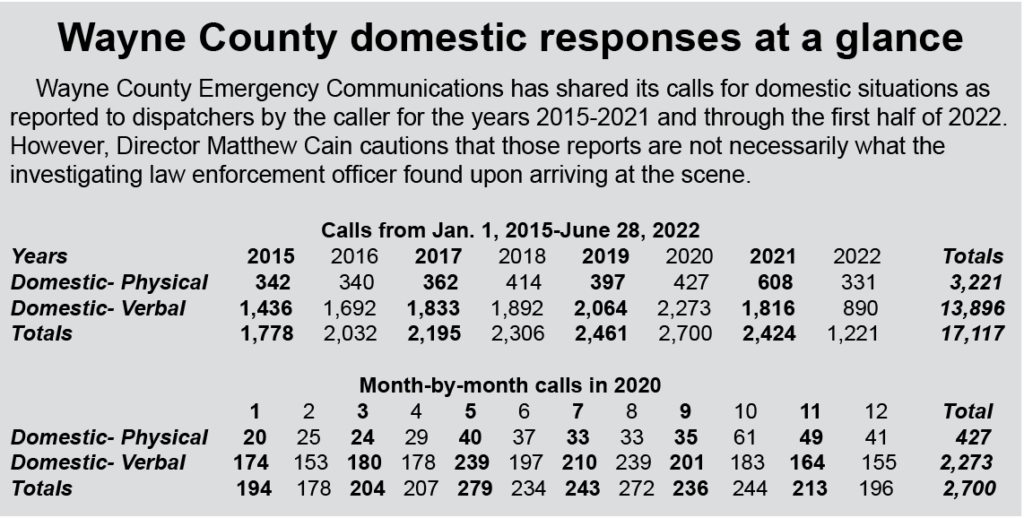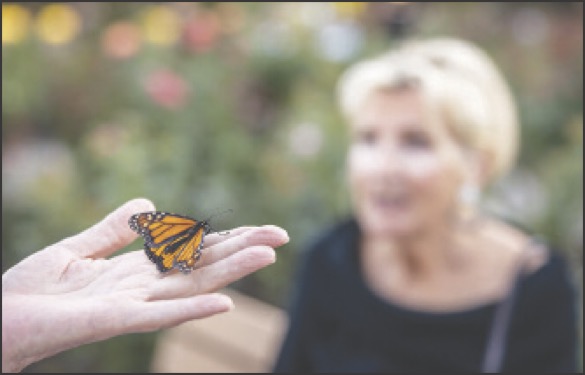Advocates now meeting domestic violence, sex assault survivors in 8 counties
Local advocates for survivors of domestic violence and sexual assault say they are trying creative ways to reach residents in need of services, and those efforts are paying off as their number of clients rises.
A Better Way, formerly known locally as Genesis of Richmond, is now providing mobile advocacy throughout eastern Indiana, traveling to meet potential clients wherever they feel comfortable.
Other initiatives include the distribution of hundreds of new informational packets, visiting more social service agencies to increase visibility among staff and residents, and posting QR codes that can subtly help connect those in need with services.
Numbers at a glance
According to Richmond site coordinator Candra Ramsey, 1,317 comprehensive services have been provided for victims of Wayne, Union and Fayette counties between January and late August 2022, with 1,272 of those services provided to Wayne County victims.
A Better Way has served 103 primary and secondary victims from Wayne, Union and Fayette counties during that timeframe, with 95 of those victims from Wayne County.
The need for domestic violence services increased in 2020 in the months after the pandemic began, based on the 2,700 calls reporting physical or verbal abuse to Wayne County dispatchers. Wayne County Emergency Communications Director Matthew Cain cautions that those initial reports might not be what an officer discovers upon arrival.
The 2021 and projected 2022 numbers have decreased to a little over 2,400, which is close to the 2019 total.
However, all those annual numbers are higher than the 1,778 calls received in 2015. Calls have steadily climbed by a couple hundred each year since then.

Mobile advocacy
Staff and board members say it’s helpful to get beyond offering services in just one building, helping ease transportation challenges and emotional barriers to entering an office.
Through mobile advocacy, A Better Way no longer requires victims to travel across Wayne County or surrounding counties to get to downtown Richmond. And, some area residents might already be closer to the organization’s headquarters in Muncie and prefer that location.
Until Oct. 1, 2021, Genesis served Wayne, Fayette and Union counties. Its board decided to merge into the Muncie-based organization last year to reduce expenses and offer a wider variety of services.
A Better Way now serves eight counties, including Henry, Randolph, Delaware, Jay and Blackford.
Help at a glance
To learn more about A Better Way services, call the Richmond office at 765-966-0538, or seek crisis support at 765-288-HELP. A suicide and crisis lifeline can be reached by phone or text at 988.
Advocates now have the flexibility to go anywhere in rural or urban areas in those eight counties to meet victims at a location of their choosing.
A few options include restaurants, food pantries or their child’s school or after-school organization, if they need to hide a visit from their partner by conducting it outside their home.
“We get creative, and no one is the wiser,” Ramsey said.
For instance, Ramsey said A Better Way recently received a call from a Randolph County woman seeking help who couldn’t get to Richmond, but since the two counties are now in a shared service area, an advocate traveled to her.
Although Muncie’s shelter is available for women from any of the eight counties requesting it, many current clients don’t feel the need to leave their homes after learning about service options. Some don’t want to disrupt their work or their children’s schooling while they receive assistance.
Available services also include transitional housing, support groups, counseling, legal advocacy and children’s programs.
Advocates are now able to spend more time going alongside clients through their journey to a better life, such as helping them file forms at courthouses or Social Security offices, instead of them feeling they must tackle those tasks alone, Ramsey said.
Transportation can be provided, and if a victim doesn’t have childcare, two advocates can go together to meet both needs. Richmond’s A Better Way office also offers “Free Fridays” when clients can visit the office and select donated items to help them make a fresh start.
Becky Jewison, a volunteer who coordinates Richmond-area fundraising efforts, said she likes A Better Way’s trauma-informed approach of helping each client develop a customized safety plan that can improve their future situation.
Advocates first determine what the client is currently experiencing and whether they are separated from their abuser at the time of the call before collaborating on a safety plan.
Washington State has offered mobile advocacy for more than a decade, and its example is now being duplicated across the nation. Other agencies across Indiana are offering mobile advocacy. While developing its program, A Better Way has visited some of those locations and talked with staff to learn how they are reaching more people.
Jewison said mobile advocacy is called the “new normal for services,” and Genesis board members deeply investigated its pluses and minuses when deciding whether to merge with A Better Way. State agencies were urging Genesis to combine resources with another organization, saying funding was going to get tougher after pandemic relief funds dried up.
Community involvement
It’s been rewarding to grow a new local program utilizing A Better Way’s expertise and programming, Jewison said.
After working remotely during the pandemic, Richmond’s staff of three advocates, a site coordinator and a front-desk employee, returned to 15 S. 11th St. in April.
Since then, the number of clients has more than tripled, which Ramsey attributes to word spreading about the organization’s mobile services.
Ramsey said A Better Way began providing mobile advocacy services at the beginning of May. Since May, staff have provided 640 services to 79 primary and secondary victims. (Those numbers do not include education provided to community members or information and referrals for those who have come to the organization but are not victims of domestic violence or sexual assault).
Since they aren’t tied to the building, advocates have had more opportunities to go out in the community and build partnerships with various social service providers, and those connections have resulted in lots of success stories, Ramsey said.
Mobile advocacy has helped break down previous silos that non-profit or government organization have traditionally been in, Ramsey noted.
For instance, local advocates have spent time at food giveaways, trustee’s offices and needle exchange programs in Wayne and Fayette counties, hoping to reach those already seeking assistance for various needs.
After seeing advocates out in the community on a regular basis, Ramsey said potential clients often feel more comfortable asking for help.
“The barrier to walking through our door is huge for a lot of people,” Ramsey said.
Ramsey shared nearly 20 quotes from satisfied clients on a mobile advocacy service evaluation form. One was grateful that an advocate can come to her home because she is not as stressed with her schedule. Another called the staff “literal angels walking this earth.”
Ramsey said staff from other agencies sometimes call A Better Way to refer a potential client, saying a particular person would never voluntarily walk through their doors, but might welcome help if approached.
Staff have worked with local law enforcement agencies in hopes of smoothing connections between the victims they see and services. Officers now have an updated victim rights packet to distribute when they suspect abuse.
The packet includes information about protective orders, characteristics of an abuser, safety plans and what domestic violence is, in hopes of breaking the cycle.
About 700 packets have been distributed so far in Wayne County, and staff hope to distribute more to other potential entry points as requested.
Staff also are posting stickers in local restrooms with QR codes, making its information discreet. Victims can take a photo of a QR code to connect to A Better Way via their phone instead of tearing off a phone number from a paper flyer, as offered in previous decades.
Ramsey said the QR codes are “going like hotcakes,” and additional community partners to share packets or QR codes are welcomed.
A Better Way also is developing some partnerships to offer broader services to underserved populations in the Wayne County area.
A teen support group is being started for those impacted by domestic violence or sexual assault in collaboration with JACY House (Justice and Advocacy for Youth). And, Richmond’s Latino Center, Amigos, plans to hire a bilingual advocate whose salary will be divided between the two organizations.

